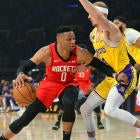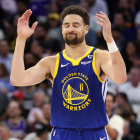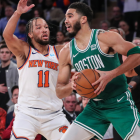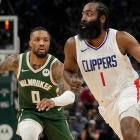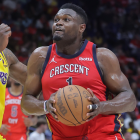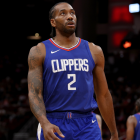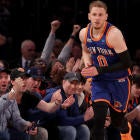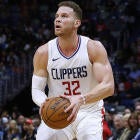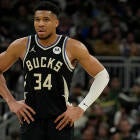For one night at least, Houston Rockets general manager Daryl Morey looks like a genius. In their second game since trading Clint Capela and committing, for better or worse, to an extreme small-ball approach with 6-foot-5 P.J. Tucker as the starting center, the Rockets took down the Los Angeles Lakers, 121-111, on Thursday.
As far as regular-season victories go, it was about as impressive a showing as you'll see, particularly from Russell Westbrook, who was the most idealized version of himself in torching the Lakers for 41 points, eight boards and five assists on 61-percent shooting. This has been a trend for a while now, with Westbrook playing lights out via a more concentrated effort on playing to his strengths. Over his last 10 games, he's averaged 22 points per game in the paint, which leads the NBA.
It's a stark departure from some of Westbrook's more concerning overall numbers this season. Among all players who've taken at least 100 3-pointers, Westbrook's 23-percent mark is the worst in the league. Entering Thursday, he was shooting just 33 percent on shots outside five feet. He ranks in the 17th percentile in all jump shots and the 26th percentile in jump shots off the dribble, per synergy. When his hot streaks include a lot of hot shooting from outside, bet big on a crash, because settling for those shots almost always eventually gets him into trouble.
But what we saw on Thursday night feels more sustainable than a typical Westbrook hot streak that we know can turn cold in the snap of a finger. Against the Lakers, there was no settling. You didn't even sense the temptation. The few short mid-range shots he did take, and mostly make, were once he was already in rhythm. For the most part, his eyes were lit up and focused downhill all night.
Without a big man in the paint, and Rockets shooters all around the arc pulling Lakers defenders away from rim, Westbrook had a one-on-one lane to the rim almost every possession, and he was unstoppable. Here he gets Kyle Kuzma one-on-one, and with no protection behind him, Kuzma has no chance:
Here Westbrook does his damage in transition, where he is going to go straight to the rim every time without a rim protector on the floor -- which, moving forward, is going to often be the case as teams are forced to downsize in an effort to not get run off the floor by Houston's small-ball lineup:
When teams do try to stay big to exploit Houston's small lineup, that works in Westbrook's favor, too. Look at this next play, and pay particular attention to JaVale McGee, No. 7 for the Lakers, running out to cover a Houston shooter as Westbrook accelerates through the vacated lane:
The shooter McGee is running toward is Convington, the guy who replaced Capela. If Capela is on the court in this situation, he is no threat spacing out to the 3-point line. He would've run to the rim, taking McGee with him, which would've closed Westbrook's lane.
You'll notice in the above clip that in addition to McGee, the Lakers have Anthony Davis on the court. The Lakers, in theory, would be a prime example of a team that should expose Houston's small-ball lineup with all their size. But the exploitable matchups work both ways. If the Rockets have to try to guard Davis with P.J. Tucker, then the Lakers spent much of Thursday asking Davis -- in a default move for lack of a bigger player on the court -- to guard Westbrook. It didn't go so well.
Look at how open the rim is on these plays without a Houston big man hanging out down there. When that's the case, Westbrook is virtually unstoppable. Put a big man on him, and he's too quick. Put smaller guys on him without backside size to bail them out, and he's too powerful:
Playing small is certainly nothing novel in today's NBA. But it's usually done in stretches. Moving to a small lineup permanently, for all intents and purposes, is still an extreme approach. But the Rockets are an extreme organization. They've taken the statistically-sound strategy of shooting a lot of 3-pointers and layups to the extreme of basically shooting only 3-pointers and layups. When Morey was asked why he ultimately felt trading Capela and going small was the right move, he spoke to everything we just noted in the clips and analysis above.
"The best way to play with our stars, that we feel is the one that gives us the best chance to win the championship, is with a stretch four, playing up-tempo, shooting and wing defenders," Morey said, via the Houston Chronicle.
That last part about the defense, with the multiple wing defenders, is important, too. Capela was totally exposed in last year's playoffs by the Warriors, who forced him to come out on the perimeter and defend their scorers off pick-and-roll switches and isolation. He had no chance.
With Harden, Westbrook, Eric Gordon, Covington and Tucker, the Rockets can switch every action and remain in comfortable matchups on the perimeter. It will require all those small guys to battle like hell on the inside, and Tucker and company did that all night against the Lakers -- boxing out, bodying post players, scrambling for rebounds, and on down the line of hustle plays. That takes a lot of energy, but the same can be said for big guys trying to run with Houston's smalls.
It's a chess match, and the Rockets feel a lot more comfortable with the pieces they have on the board than they did a few days ago. In many ways, Westbrook was always going to be the barometer for this team's eventual playoff fortunes. Defenses are going to double Harden; the Lakers did it consistently Thursday night and held him to 14 points on 3 of 10 shooting.
Harden is not going to be held to 14 points on 10 shots often, but the fact remains that he is going to have to pass out of those doubles, and Westbrook is going to have to make the defenses pay when he does. He's not going to do it as a settling shooter, which Capela's lane-clogging presence encouraged. Morey has flipped that script, cleared Westbrook's runway, and Houston might've just taken off.













